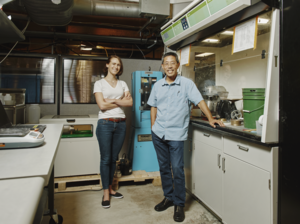A startup that may have solved the problem of keeping the temperature comfortable for everyone at work (at last!) has raised $1.4 million to expand its approach to more places.
The company, Somerville’s CrowdComfort, has developed a messaging app that lets employees convey when they’ve encountered a problem in the office to the right person. Importantly, the startup has also come up with an indoor mapping approach that relays the precise location where the issue is taking place.
Initially CrowdComfort was focused on letting employees communicate about being too cold or hot in the office, and that’s still a main selling point. But the app has also grown to include the ability to relay many other types of issues—such as maintenance (e.g., "there's a burst pipe in the restroom").
“Ultimately we’ve created this new way of communicating these everyday issues in buildings with the folks that are on the back end,” CrowdComfort CEO/co-founder B. Eric Graham told BostInno. Companies that are using CrowdComfort include GE, National Grid, Massachusetts College of Art & Design and Taconic Investments (at Google in New York). The startup, based at Greentown Labs, is now generating revenue and has grown to employ 10 overall. Advisors of the company include veteran EnerNOC executive Gregg Dixon and well-known local entrepreneur Doug Levin, founder of Black Duck Software.
The new funding comes from about 15 angel investors and was led by Jeffrey Chizmas, owner and CEO of investment firm Chizmas Holding Company. It’s added to an initial $300,000 round raised by CrowdComfort in 2014.
Graham, formerly of Next Step Living, and the company’s other founders launched it during the Boston Clean Web Hackathon in 2013.
Companies are "wasting energy and making people uncomfortable at the same time, which affects their productivity."
The startup’s approach involves creating a virtual map of the floor plan of a building and creating “locations” within the building that will pop up for an employee in the app (or can be scanned as a QR code). If an employee is hot or cold, for instance, they can send a message about the location directly to the individuals who manage the HVAC system. Along with helping to keep employees more comfortable (and easier communication for building facilities managers), the approach also saves a significant amount on energy costs, Graham said. “Seventy-five percent of the reports are ‘I’m freezing,’ or ‘I’m cold.’ That’s just wasting energy and making people uncomfortable at the same time, which affects their productivity,” he said.
Meanwhile, some customers have been even more interested in the other capabilities of the app besides addressing issues with office temperature, Graham said; for instance, one customer has been using the app to manage a checklist of items such as inspections on sprinklers and generators.
But the big question: doesn’t this lead to an inundation of complaints? Graham says that hasn’t been the case, because the app has a “self-policing” component to it; when an issue is relayed to building mangers, other colleagues are able to see what’s been reported—and so employees don’t want to be seen as reporting frivolous issues.








